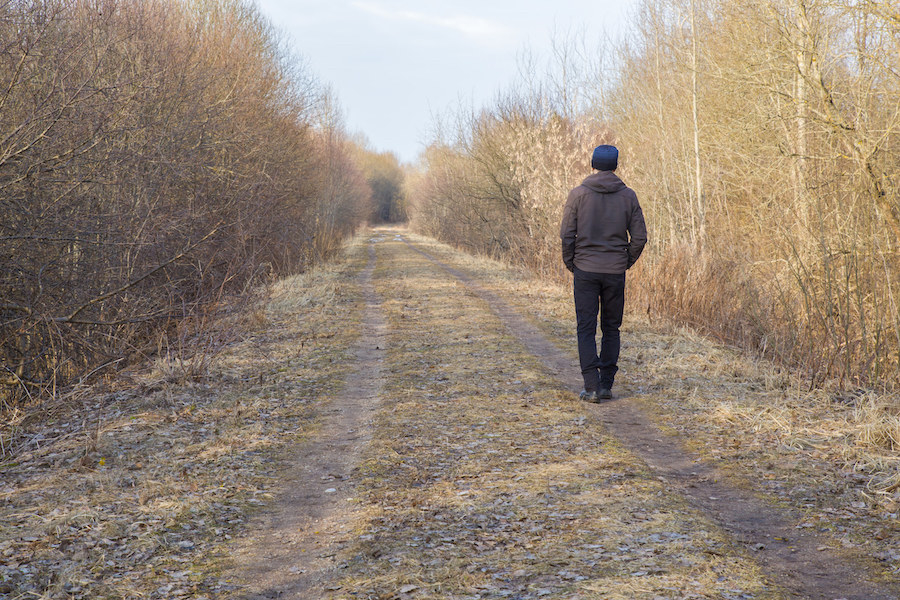Jacklyn
“My self-esteem took a major blow. The person I saw in the mirror looked sad. Her skin looked sallow. She looked lost and unhappy. Her clothes didn’t compliment her; they hung on her small frame. I didn’t let anyone else see this, except for my boyfriend now and then. To most of the people around me, I was keeping my head held high, I was doing great. I looked great. I was so positive. I had bad days, but I was determined. Inside, though, I was full of doubt and fear. I was depressed.
"[When I was diagnosed], I wasn’t told about the impact that ulcerative colitis would have on my mental health. It took a lot over the last two years to realize that the life I had before was gone, and to accept that it was not coming back. I had to mourn that life and realize that I have a new life with UC. Having this disease has taken me into the deepest, darkest trenches of my mental health. I’ve lived with depression and faced the possibility of death. I know what it’s like to be told, ‘We don’t know how to treat you.’ I know the weight of the feeling of uncertainty about what could happen next. I know the feeling of being invisible when people say, ‘You’ve lost so much weight; you look great!’ while inside you don’t even recognize your own body and feel as though someone keeps twisting a knife in circles in your intestines. I know the overwhelming feeling of fatigue, and I know the guilt of having to cancel plans because your body just needs rest and you can’t help it. I know the shame, the fear, the sadness, and the loneliness. I know that this disease is a monster.
"Ulcerative colitis is invisible not only physically but also mentally. The feelings of depression and anxiety are real and raw and need to be addressed in a patient’s treatment plan. I make it my mission to ensure that other patients feel supported and are doing well with not only the physical ailments this disease presents but also the drastic effect it has on mental health. I am visible, I am strong, and I am determined to keep fighting for myself and others.”

Rena
"Philosopher Wayne Dyer once said that 'when we change the way we look at things, the things we look at change.' When I was diagnosed with ulcerative colitis in 2008, it was easy to fall into a mode of feeling isolated and alone during periods of flares. I forgot what life was like as an energetic and healthy young professional. The expectation of a healthy life and the unfair reality caused a lot of unnecessary suffering. What I learned is that we all have the option to dance with life. Crisis can open a door to a new opportunity, a loss can be seen as a gain, and a breakdown can turn into a breakthrough."
Mitchell
"My journey started when I was a normal 14-year-old boy in his eighth grade year of school. ... I began having IBD symptoms in the spring of 2009. I started having to run to the bathroom all the time and constantly being tired and run down. It took three years to get an official diagnosis because I was misdiagnosed with C-Diff.
"I was officially diagnosed with Crohn's disease on Dec. 16, 2011. I remember a feeling of relief when I heard the news that we finally knew what exactly was wrong with me. Of course I had no idea of what Crohn's is and how it would affect my everyday life, but I soon figured out that it was going to be the biggest challenge of my life.
"During the period of diagnosis, I had gotten very sick. I had lost over 60 pounds, I was throwing up every time I ate, and I had to quit sports because I couldn't hold my own. I was to the point where I wanted to give up. I basically cut myself off from the world around me; I didn't attend many school events, and I only told a few people what was wrong with me.
"It took me about a year to finally accept my diagnosis and move on with life. One night, I just got sick of living life in the dark, and I told myself that this is the life that I was given and that I am going to try and make the biggest difference I can. My family and friends have helped me cope and have given me so much support; I will never be able to thank them enough."

Nicholas
"I was very active in high school. … I knew I wanted to go to university for academics but would've loved an athletic scholarship. I couldn't pay for school, so I went looking for scholarships from our military. My grades were good enough that I was offered a full-ride scholarship, with stipend, to my local state school from the Air Force as long as I majored in physics. … I became your typical university ROTC student, focusing on physical training more so than bodybuilding.
"In late September 2014, I started having frequent bowel movements. By October, it had gotten so bad that I had developed a small hemorrhoid, which is a big no-go for the ROTC. Instead of doing something about it, I hoped it would go away. By late October, the bowel movements had started to get to me — I was losing energy and starting to drop weight, and over-the-counter remedies did nothing to help. I was hospitalized Thanksgiving break and was prescribed prednisone for the first time. I continued to lose weight, and I continued to have diarrhea. … I came back to school for finals week, continuing my medication, to finish out the semester. Loaded up with another six weeks of prednisone. ... I took the entire break off and had to sleep most of it away due to the pain and diarrhea.
"By the time the spring semester started again in January, I was down to 180 pounds, white as a sheet from the prednisone, and still having bowel movements five to six times a day. I went to the doctor again, and he referred me to a gastroenterologist. That day was the first day I heard the words 'inflammatory bowel disease.' I was given another six weeks of prednisone at a higher dose and was told to cease all physical activity. Spring semester was our field training (ROTC's version of basic) preparation semester, so I had to nail it in the physical training department so my profile could be as strong as possible for selection. ... Nevertheless, I continued to charge forward with my training, duties, and classes, all the while living with pain and diarrhea. I was hospitalized for the second time in late February after the symptoms had gotten worse than ever. I spent four days getting scanned and checked up on until finally a diagnosis was made — Crohn's disease. Not curable, manageable, but very debilitating.
"The strain my diagnosis of Crohn's disease put on everything in my life was immeasurable. It put a wedge between everything: my family, girlfriend at the time, friends, classmates, roommates, etc. By mid-April, I had managed to squeak by in every respect and earned a Field Training slot. I was now down to 165 pounds, practically skin and bones. I couldn't pass the Physical Fitness Assessment. … Somehow word made it back to our sergeants that I was on medication, and I was forced to bring in all of the paperwork on my diagnosis of Crohn's disease.
"The word was no, I was completely disqualified. My scholarship was gone, stipend gone, and job offer and all other solace gone. I was deemed undeployable and was therefore not wanted by any other branch at my school. I was completely devastated. I broke up with my girlfriend of three years. I struggled to cope with it all and fell into a deep depression where I continued to lose weight as I started my long-term treatments for Crohn's. Not only had I lost all of my friends in ROTC, I lost my mind, my girl, my scholarship that was paving the way to my academic success, and even my job after school. Everything I had worked for in the past three to four years was riding on that offer.
"During the summer though, something clicked. ... As soon as I could walk around and move without too much pain, I was hitting the local gym to see what I could get myself into. Putting on my headphones and being able to deal with reality for an hour or two was the best way for me to process what had happened."
Samantha
"I was diagnosed with ulcerative colitis when I was 4 years old. ... It has been 20 years since my diagnosis, and I have gone through numerous surgeries, traveled around the US to visit surgeons to get the best possible care, and tried almost every medication/treatment possible at the time.
"I was 6 years old when I underwent my first surgery to have my large intestine removed and an ileoanal pull-through done. I was doing really well with a handful of regular flares and pouchitis until I hit my sophomore year of high school. That was when everything changed for me.
"I got really sick again and started having insane amounts of stomach pains. From there, it was constant medical testing. ... I traveled up to Boston to see the surgeon who did my original surgery. He found that I had a partial obstruction that would be easily fixed with surgery. Unfortunately, when I woke up, the pain was still there.
"That is when focus pointed to my pancreas. We learned later that there have been studies that have shown pancreatic problems that may be associated with UC. A few years after being told I wasn't a candidate for surgery and my body slowly deteriorating, I traveled up to the University of Minnesota for a total pancreatectomy with auto islet cell transplantation.
"It’s been six years since my transplant, and I'm the healthiest I've ever been. I struggled a lot with anxiety and depression when I was sick, and that still follows me today. Thanks to my amazing doctors and surgeons, I graduated from high school in 2011 and graduated from George Mason University in 2015. Today, I still blog about my experience in hopes to help others who are like me. I also volunteer through my hospital to help people of all ages dealing with the idea of surgery."

Jessica
"I received my diagnosis at 14, and I can still remember my doctor telling me, 'Jessica, you have Crohn's disease, and it is something you will have for the rest of your life, but the good news is that with the right life choices and medications, you can still do everything you've wanted to do and live a long happy life.'
"My desire to become a doctor started in high school and grew stronger in college as I experienced the difference my doctors made in my life. In my fourth year of college, I took the Medical College Admissions Test (MCAT) for entrance into medical school. During this time, I happened to be in a long and painful flare. I was admitted into the hospital and an MRI was ordered, and, as luck would have it, it was the same day and time that my MCAT score was going to be posted. Lying still in the MRI, my only thoughts were of my MCAT scores.
"Back in my hospital room, I immediately grabbed my phone — as soon as I saw my score, I burst into tears. It was the score I was hoping for.
"It was in my third year of medical school that my Crohn's disease decided to stomp on the brakes. After numerous hospital visits, I learned that medications could no longer control my disease. I now required surgery. Hearing this news was incredibly difficult. I didn't have time for surgery — I needed to be at school; I had to finish medical school in four years like you are 'supposed to.' I was overcome with anxiety, depression, and fear as to what the future had in store for me. The six months surrounding my surgery were some of the toughest. I relied on my family and friends for extra support. Working to build me up, my support system was there with me every step of the way.
"Last September, I had 18 inches of my small intestine removed as well as my appendix. Surprise, I also had appendicitis; however, I had no idea since I was accustomed to living with pain. I missed six months of medical school and made the difficult decision to delay my graduation by one year. I realize it is a completely normal reaction to want to do things the way you are 'supposed to,' but Crohn's disease has a mind of its own and often strays from the most likely path. At first glance, this seemed like a bad thing, but for me, it has actually been a blessing. Straying off the normal path has not only made me a stronger person, but it has also afforded me opportunities that I would have never otherwise experienced — taking trips with loved ones, meeting new people, and helping me to find a better life balance between school and Crohn's disease. Living with IBD has made me a strong believer in the phrase 'Everything happens for a reason.'"

Courtney
"I love to see what I have made it through! I feel like I could face anything. I overcame the struggle that we all fall into of pain, depression, and hopelessness by reaching out and building friendships in the Crohn's community. These relationships not only encouraged me but created wonderful friendships. It is so wonderful to have people who know what you are going through and who support you 100% without judgement and know exactly what to say to make your day better. I had to change my mindset to not feel sorry for myself and let the disease win. I took up reading motivational books, coloring, crocheting, and really anything to keep my mind busy and to allow my body to heal.
"I want patients to know that whatever you are battling, if you press through, it will get better! There is nothing that you are facing now that you are not strong enough to get through. You are brave. You are strong. You are a warrior!! I'm so grateful to all those who have believed in me and just know there are so many people who believe in you. Keep the faith and don't lose hope — I promise there are brighter days to come!"
